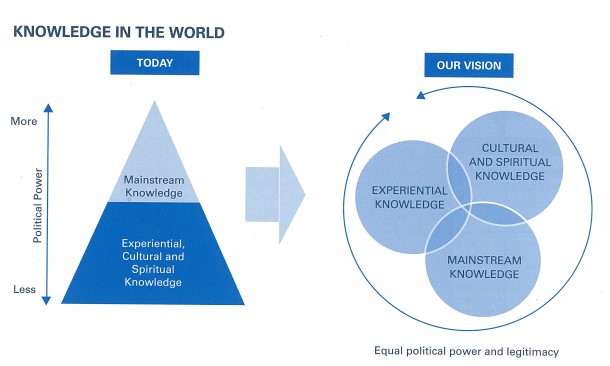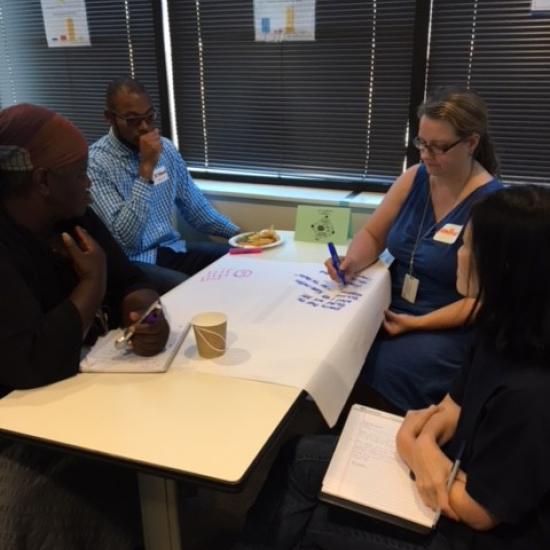Reimagining Knowledge, Power and Experience for Community-Driven Change
At some point, many of us have heard the phrase, “knowledge is power,” but how many of us have actually taken that phrase literally?
For many years, my understanding of knowledge was based on a 'gatekeeping lens.' I thought about power and knowledge as objective truth – separating those know from those who do not know. In my oversimplified thinking, I thought knowledge only existed in schools and universities, and I viewed those institutions as the gatekeepers of knowledge.
Since then, my ideas about knowledge have evolved – become more inclusive and complex, particularly as I realize the innate assets and knowledge that live in community and culture.
A More Inclusive Framework of Knowledge

Source: DataCenter
Borrowing from the DataCenter’s framework on research justice, I’ve been able to shift my view of knowledge from the limiting arena of academia to the vast knowledge that exists in community members, elders, and youth.
In the image above, we can see that most knowledge in the world today exists in a hierarchical pyramid. Mainstream knowledge (often knowledge published and produced by universities, researchers and subject “experts”) are given more legitimacy and political power. A key example of this is when a group of employees raise concerns about workplace climate, and the first thing management does is hire an outside consultant to come in and conduct a workplace survey that reiterates the concerns employees originally brought up. This highlights how the word of an “expert” is deemed more legitimate than the experiential testimonies of the employees.
So how do we shift from this hierarchy of knowledge to a more inclusive framework that accepts and, thus, values all knowledge as equally powerful and politically legitimate?
Well, we can start by recognizing the different kinds of knowledge that exist in the world. Experiential, cultural/spiritual, and mainstream knowledge are all different sets of knowledge and they are interconnected. Depending on who you are trying to reach or what your goals are, one type of knowledge may be more effective than the other, but all three are necessary to achieve community-driven change.
Partnering with Community to Produce Knowledge
More pointedly, we can also change the way we engage with communities to produce and wield knowledge.
Many times voices from communities that have been marginalized get ignored and instead those with more power get to tell our stories, often with their own agenda. The result is that: history books don’t tell our stories; official reports are expensive, inaccessible, and often hard to understand; policies that are passed are informed by mainstream research and don’t include the experiential knowledge of those impacted by the policies; and deficit-oriented and negative messages are created about our neighborhoods.
When we limit ourselves to just one type of particular knowledge we perpetuate the gatekeeping of knowledge and we diminish our opportunities to learn. There is a powerful Maori quote and belief, “Do not research for me, do not research with me, research as me.” I truly believe that by creating and using knowledge as agents of self-determination, we can increase our ability to change our own lives and our communities. We should strive to affirm our experiences and knowledge (in all forms) as legitimate sources of empowerment and cause for action.
As the Learning, Data, and Results Program Manager for Saint Paul Promise Neighborhood, I am intentional about the ways we partner and how we collaborate with community to collect data and produce knowledge that shapes the strategies of the initiative. Guided by the values of diversity, equity, inclusion and justice below, I strive to approach community organizations and members as experts in their own right to creating and advancing change.
